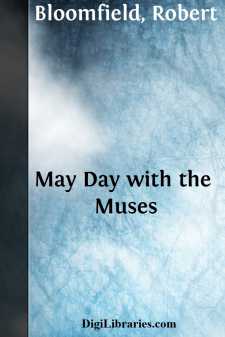Categories
- Antiques & Collectibles 13
- Architecture 36
- Art 48
- Bibles 22
- Biography & Autobiography 813
- Body, Mind & Spirit 142
- Business & Economics 28
- Children's Books 15
- Children's Fiction 12
- Computers 4
- Cooking 94
- Crafts & Hobbies 4
- Drama 346
- Education 46
- Family & Relationships 57
- Fiction 11828
- Games 19
- Gardening 17
- Health & Fitness 34
- History 1377
- House & Home 1
- Humor 147
- Juvenile Fiction 1873
- Juvenile Nonfiction 202
- Language Arts & Disciplines 88
- Law 16
- Literary Collections 686
- Literary Criticism 179
- Mathematics 13
- Medical 41
- Music 40
- Nature 179
- Non-Classifiable 1768
- Performing Arts 7
- Periodicals 1453
- Philosophy 64
- Photography 2
- Poetry 896
- Political Science 203
- Psychology 42
- Reference 154
- Religion 513
- Science 126
- Self-Help 84
- Social Science 81
- Sports & Recreation 34
- Study Aids 3
- Technology & Engineering 59
- Transportation 23
- Travel 463
- True Crime 29
May Day with the Muses
Description:
Excerpt
August, 1790.
The bard, who paints from rural plains,
Must oft himself the void supply
Of damsels pure and artless swains,
Of innocence and industry:
For sad experience shows the heart
Of human beings much the same;
Or polish'd by insidious art,
Or rude as from the clod it came.
And he who roams the village round,
Or strays amid the harvest sere,
Will hear, as now, too many a sound
Quiet would never wish to hear.
The wrangling rustics' loud abuse,
The coarse, unfeeling, witless jest,
The threat obscene, the oath profuse,
And all that cultured minds detest.
Hence let those Sylvan poets glean,
Who picture life without a flaw;
Nature may form a perfect scene,
But Fancy must the figures draw.
The word "fancy" connects itself with my very childhood, fifty years back. The fancy of those who wrote the songs which I was obliged to hear in infancy was a very inanimate and sleepy fancy. I could enumerate a dozen songs at least which all described sleeping shepherds and shepherdesses, and, in one instance, where they both went to sleep: this is not fair certainly; it is not even "watch and watch."
"As Damon and Phillis were keeping of sheep,
Being free from all care they retired to sleep," &c.
I must say, that if I understand any thing at all about keeping sheep, this is not the way to go to work with them. But such characters and such writings were fashionable, and fashion will beat common sense at any time.
With all the beauty and spirit of Cunningham's "Kate of Aberdeen," and some others, I never found any thing to strike my mind so forcibly as the last stanza of Dibdin's "Sailor's Journal"—
"At length, 'twas in the month of May,
Our crew, it being lovely weather,
At three A.M. discovered day
And England's chalky cliffs together!
At seven, up channel how we bore,
Whilst hopes and fears rush'd o'er each fancy!
At twelve, I gaily jump'd on shore,
And to my throbbing heart press'd Nancy."
This, to my feelings, is a balm at all times; it is spirit, animation, and imagery, all at once.
I will plead no excuses for any thing which the reader may find in this little volume, but merely state, that I once met with a lady in London, who, though otherwise of strong mind and good information, would maintain that "it is impossible for a blind man to fall in love." I always thought her wrong, and the present tale of "Alfred and Jennet" is written to elucidate my side of the question.
I have been reported to be dead; but I can assure the reader that this, like many other reports, is not true. I have written these tales in anxiety, and in a wretched state of health; and if these formidable foes have not incapacitated me, but left me free to meet the public eye with any degree of credit, that degree of credit I am sure I shall gain.
I am, with remembrance of what is past,
Most respectfully,
ROBERT BLOOMFIELD.
Shefford, Bedfordshire,
April 10th, 1822.
MAY-DAY WITH THE MUSES.
THE INVITATION
O for the strength to paint my joy once more...!






